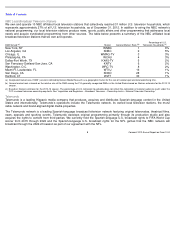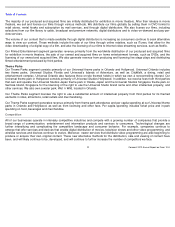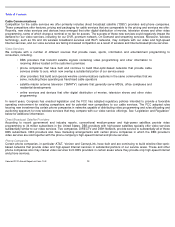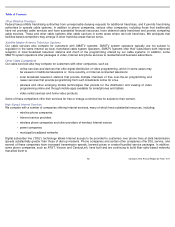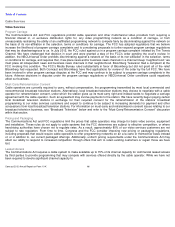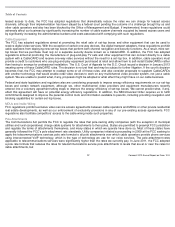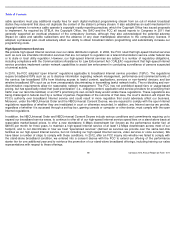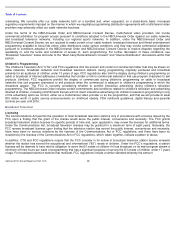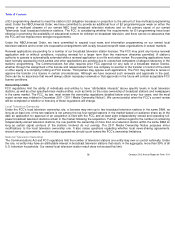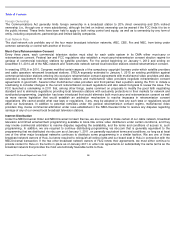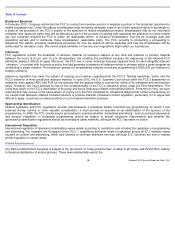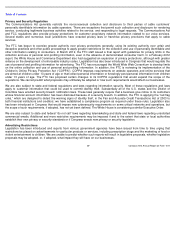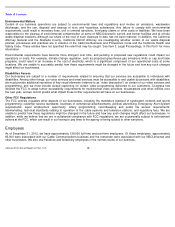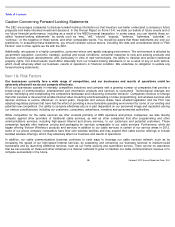Comcast 2012 Annual Report Download - page 22
Download and view the complete annual report
Please find page 22 of the 2012 Comcast annual report below. You can navigate through the pages in the report by either clicking on the pages listed below, or by using the keyword search tool below to find specific information within the annual report.
Table of Contents
cable operators must pay additional royalty fees for each digital multicast programming stream from an out-
of market broadcast
station they retransmit that does not duplicate the content of the station’
s primary stream. It also establishes an audit mechanism for
copyright owners to review a cable operator’
s copyright royalty reporting practices, which the Copyright Office has issued proposals
to implement. As required by STELA, the Copyright Office, the GAO and the FCC all issued reports to Congress in 2011 that
generally supported an eventual phaseout of the compulsory licenses, although they also acknowledged the potential adverse
impact on cable and satellite subscribers and the absence of any clear marketplace alternative to the compulsory licenses. If
adopted, a phaseout plan could adversely affect our ability to obtain broadcast station programming and substantially increase our
programming costs.
High-Speed Internet Services
We provide high-speed Internet services over our cable distribution system. In 2002, the FCC ruled that high-
speed Internet services
such as ours are interstate information services that are not subject to regulation as a telecommunications service under federal law
or to state or local utility regulation. However, our high-
speed Internet services are subject to a number of regulatory obligations,
including compliance with the Communications Assistance for Law Enforcement Act (“CALEA”) requirement that high-
speed Internet
service providers implement certain network capabilities to assist law enforcement in conducting surveillance of persons suspected
of criminal activity.
In 2010, the FCC adopted “open Internet” regulations applicable to broadband Internet service providers (“ISPs”).
The regulations
require broadband ISPs such as us to disclose information regarding network management, performance and commercial terms of
the service; bar broadband ISPs from blocking access to lawful content, applications, services or non-
harmful devices; and bar
wireline broadband ISPs such as us from unreasonably discriminating in transmitting lawful network traffic. The no
-blocking and non-
discrimination requirements allow for reasonable network management. The FCC has not prohibited speed tiers or usage-
based
pricing, but has specifically noted that “paid prioritization” (
i.e., charging content, application and service providers for prioritizing their
traffic over our last-mile facilities) or an ISP’
s prioritizing its own content likely would violate these regulations. These regulations are
being challenged in federal court by a number of parties. Regardless of the outcome of that case, the court’
s decision will impact the
FCC’
s authority over broadband Internet service and could result in more regulation that could adversely affect our business.
Moreover, under the NBCUniversal Order and the NBCUniversal Consent Decree, we are required to comply with the open Internet
regulations regardless of whether they are invalidated in court or otherwise rescinded. In addition, any Internet service we provide,
regardless of whether it is accessed through a set-
top box, gaming console or computer or other device, must comply with the open
Internet regulations.
In addition, the NBCUniversal Order and NBCUniversal Consent Decree include various conditions and commitments requiring us to
expand our broadband service areas, to continue to offer all of our high-speed Internet service speed tiers on a stand-
alone basis at
reasonable market-
based prices, to offer a new standalone 6 Mbps downstream tier (known as the performance starter tier) at
$49.95 per month for three years, to maintain a high-
speed Internet service of at least 12 Mbps downstream across most of our
footprint, and to not discriminate in how we treat “specialized services” (defined as services we provide over the same last-
mile
facilities as our high-speed Internet service, but not including our high-
speed Internet service, video services or voice services). We
have taken a number of steps to comply with these conditions. In 2012, after an FCC inquiry into whether we failed to comply with
the stand-
alone broadband condition, we entered into a consent decree with the FCC to extend our offering of the performance
starter tier for one additional year and to reinforce the promotion of our stand-
alone broadband offerings, including training our sales
representatives with respect to these offerings.
19
Comcast 2012 Annual Report on Form 10-
K


